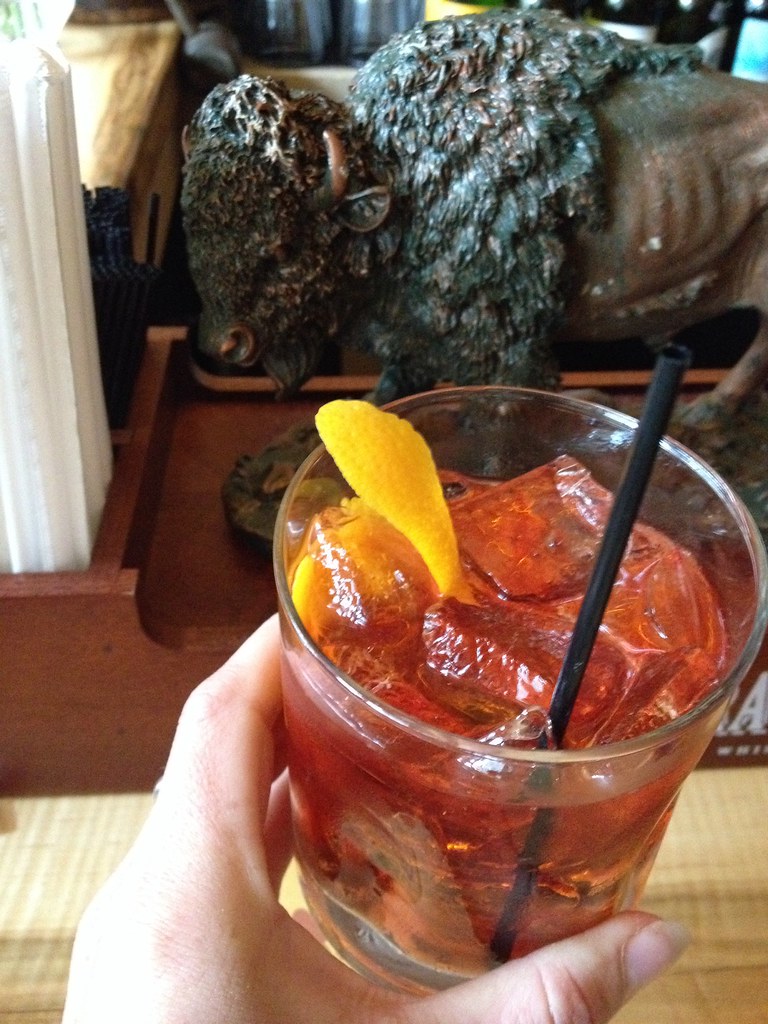My friend Jimmy just arrived in town on the tall ship
Amistad. They're docked at Portland Yacht Service for some repairs (you can walk down to the boat during the day, but they're not offering public sails or tours), and I had a tour of the boat on Tuesday evening.
Standing in the huge galley by the still-warm cast iron stove, nibbling on (OK, scarfing down) a slice of some phenomenal cake, I was reminded of my time on tall ships and all the wonderful memories I'd formed, thanks to those boats' galleys. That the best parties end up in the kitchen is a truism on land and at sea.
 |
| Sailing to Catalina Island on Schooner Lynx - Jimmy's the ginger |
When I started working on boats, I quickly realized that it paid off to be in with the cook. On my first schooner, I befriended the cook, Jesika, and as a result was always sent off to help her provision at the grocery store. We'd take a taxi or bum a ride from a friend of the boat (there's one in every port) and spend hours filling multiple grocery carts in the store.
Back at the boat, we'd pass everything down the ladder into the galley, and I'd get to help her organize it. Everything had to be stowed meticulously to save space and so the cook can find what she needs for a meal. All of that work was vastly superior to boat maintenance or chaperoning an educational activity on shore with the kids.
 |
| The main cabin of Schooner Lady Maryland - everything that can be sat upon also acts as storage for the galley |
Jesika went to culinary school, worked in restaurants, and was an experienced sea cook, so everything she turned out was amazing. Seriously. Leftover night was my favorite, because I could revisit all of my favorite meals from that week all at once.
She taught me to love yellow Indian curry with potatoes; her barbecue pulled pork was sweet and juicy; I still think of even the simple lunches of homemade naan bread, fried sausage slices, herbed yogurt dip, and a dish of sliced tomatoes and onions.
 |
| Not all cooks make everything from scratch, only the smart ones |
Lady Maryland is run by
Living Classrooms Foundation in Baltimore and offers educational day trips during the spring and fall and extended live aboard programs for gifted and talented students during the summer. We sailed from Maryland to Massachusetts studying whales.
At the time, the other two boats in LCF's fleet offered similar day trips during the school year, but couldn't accommodate students sleeping onboard for longer trips. So Mildred Belle and Sigsbee sailed around the Chesapeake Bay to various docks, with the kids and some of the crew camping ashore at night.
 |
| Buy boat Mildred Belle anchored in a river off the Chesapeake Bay |
The meal program onboard these boats wasn't as luxurious as Lady Maryland's. There was no paid cook, but rather a crewmember who would peel off from the morning's lessons to lay out lunch for kids and crew. Lunch was usually sandwiches, chips, vegetables, and fruit.
Dinner was prepared ashore, with all of the kids pitching in on the prep, cooking, and most importantly, the clean-up. Meal planning was done by the crew (usually me, the educational coordinator, and the Captain), and after a summer of hot dogs and hamburgers, we started to get ambitious.
There was that time I decided to make fried chicken for 20 on a camp stove. After several rounds of frying chicken, I grew tired of the hot splattering grease, and passed the tongs onto an intern. He took over the flipping and frying, and I prepared a plate and dug in. After the intern turned out a few rounds of chicken, a kid came over to me, holding a drumstick with a concerned look on his face. "Is this cooked all the way through?" he asked, holding out the chicken leg. His bite through the chicken flesh revealed a glistening, pink, raw interior. Oh dear. Back to frying duty for me.
 |
| Kate Kana (L) and kids doing dishes on deck of Lady Maryland in New York Harbor |
Cooking at the dock on a boat is much like cooking while camping. Cooking underway, however, is a completely different game. I've only ever been asked to fill in for cooks (given very specific instructions) while at the dock. The only food prep I've ever done while underway is getting a sandwich out of the refrigerator.
Here's the galley of Lady Maryland when Jesika was the cook. Everything has its place and she knows where it all is. Rummaging through the galley when you're hungry is not an option. You can see the shelves have fiddles or lips at the openings, so nothing slides out. Pieces of seine twine are tied across the shelves so nothing tips over while you're underway (the picture below does not show the galley stowed for sea).
The reefer or refrigerator is either a glorified ice box or actually acts like a real refrigerator with an air-cooled condensing plate. Reefers can get really ugly really fast, so a good cook keeps everything meticulously labeled, dated, and in very secure containers. She'll know just where everything is, so again, no random rummaging. In fact, I don't think Jesika allowed anyone but her, and sometimes me, to get anything out of the reefer.
Boat stoves are usually propane and are gimbaled, so they stay level while you're at sea. The stovetop has a railing around it, so your pots stay put, and burners have fiddles, or adjustable arms that hold your pots in place. Nothing like catching a hot pot of soup while you're underway.
 |
| Lady Maryland's gimbaled stove - locking mechanism seen lower left corner of the oven |
Boat ovens can be notoriously uneven with their heat and need frequent tweaking. Above, I'm helping to fix a temperature sensor on the stove with our captain. God only knows why I was involved in that - short of being one of two people who was allowed to touch anything in Jesika's galley, I certainly didn't know anything about repairing thermocouples.

Coffee is a boat cook's most important duty - there should always be some prepared, doesn't matter the quality. Above, you can see the some silly setup in Baltimore: Mr. Coffee plugged directly into shore power. Charge the batteries? Pump out the bilge? Sure, that'd be nice. But is there hot coffee?
On the schooner Lynx, our transits were much longer and, well, shittier, than anything I experienced onboard Lady Maryland. Our cook was an experienced, cantankerous man named Krunch. Krunch is a legendary West Coast sea cook; he sailed for many, many years on tall ships. He also apparently spent several years in a Thai jail for attempting to smuggle hashish out of the country. He told great stories, natch.
The setup of Lynx's galley is a little strange - it's sort of half above deck, with a passageway down into the main salon where meals were served. There's also a window into the focsle, the cabin forward of the galley, which as a result of the level of the cabins, was at the very top of the focsle, about 8 feet up from the bunk below.
This window from the galley into the focsle allowed us sleeping below to hear a constant stream of swearing from Krunch, starting at approximately 5am. It also allowed him to issue us an easy wake up call, some variation of "grub's ready, ya shit for brains." (He meant it in the most endearing way, of course.)
It also illustrated the importance of tying everything down while sailing, even if you don't think it's possible for that object to move/fall over. One Mr. Coffee took a trip down to the focsle, through the galley window, during a long tack en route from Long Beach to San Diego. Fortunately, the bunk below the window was unoccupied on this trip, so no one had to sleep in coffee grounds that night.
 |
| Caught making a bagel late night |
Despite his gruff attitude, Krunch was a great cook. His food was always hot and there was always plenty of it. All his meals were served with his chili scallion oil - a whole mess of dried red chiles and scallions fried in vegetable oil until crispy, then poured into a bottle and topped with more oil.
Now that I know more about food safety, I cringe at this condiment being stored at room temperature. But the crew of 9 men and I always moved through it so fast, it didn't have time to spoil.
On long or rough transits, food is one of the only things that keeps you going (literally and emotionally). A cup of coffee or hot tea brought to you at the helm by the oncoming watch feels like a godsend. These little things make a difference when you're wet to your core.
Serving meals in these conditions is no easy task. People are eating, sleeping, and working at odd hours, so there's no one time where all of the crew can eat together. Usually the cook will give instructions as to what's available to eat, and you'll eat after your watch, before retiring to your bunk.
Meals usually consist of something simple, like a one-pot meal that can be kept warm on the stove. If you're not feeling well, there's always cereal, English muffins, and peanut butter and jelly. Below, you can see the black non-stick laid out on the table, which at least gives your bowl a fighting chance at staying on the table.
 |
| I'll just have toast, thanks. |
Now we have a boat to sail in Portland's Casco Bay, where eating and cooking on board is much easier. It's more of novelty than a necessity. Detour is stocked with a galley fit for cruising: an ice box reefer, a small one-bay sink (now with running water!), a two-burner propane stove, a one-burner, gimbaled propane burner that holds a tea kettle (pretty nifty), and a grill off the back rail.
 |
| Cruising in Casco Bay |
We've grilled pizzas, fried bacon, and even scrambled eggs on the grill; it's pretty sweet. Mostly though, we just pick up a few Italian subs, fill the cooler with beer and ice, and we're off. Lunch can be had after the anchor's dropped, and we swim ashore to some island's sandy beach. Pretty luxe compared to the coffee-pot-in-your-bunk lifestyle.
Sailing on tall ships taught me how important systems are on a boat. Big boats are like an organism. In order to keep everyone healthy (again, literally and emotionally), everything has to have a place and everyone needs to do their part to make sure things are in their place - whether you're talking about the boat itself, a pencil at the navigation table, or the Sriracha for a meal (never misplace the Sriracha).
Now that I'm a recreational sailor, I'm free to implement whatever systems on board my boat that I see fit. I still clean the boat and the dishes the same way I learned on tall ships. But the difference is late night snacks are encouraged, everyone's allowed in the galley, and if we're not having fun anymore, we'll just head for shore.
Note: for tips and recipes for cooking at sea, see cruisers Barb and Stewart's blog
Harts at Sea, where Barb is chronicling their adventures. She has a great section for
Galley Tips and Recipes.





































